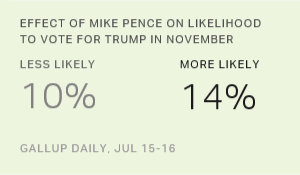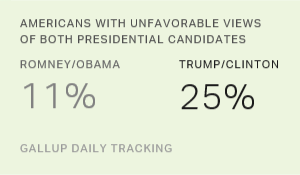Story Highlights
- 37% rate Pence positively as VP choice
- Slightly more, 45%, call Pence "only fair" or "poor" choice
- 62% offer no opinion of Pence on favorability question
PRINCETON, N.J. -- Thirty-seven percent of U.S. voters rate Indiana Gov. Mike Pence an "excellent" or "pretty good" choice as Donald Trump's vice presidential running mate. Slightly more, 45%, rate him "only fair" or "poor." This is a replay of voters' reactions to Mitt Romney's choice of Wisconsin Rep. Paul Ryan as his running mate four years ago. Thirty-nine percent of registered voters rated Ryan positively and 45% rated him as only fair or poor.
| Excellent/Pretty good | Only fair/Poor | No opinion | ||||||||||||||||||||||||||||||||||||||||||||||||||||||||||||||||||||||||||||||||||||||||||||||||||
|---|---|---|---|---|---|---|---|---|---|---|---|---|---|---|---|---|---|---|---|---|---|---|---|---|---|---|---|---|---|---|---|---|---|---|---|---|---|---|---|---|---|---|---|---|---|---|---|---|---|---|---|---|---|---|---|---|---|---|---|---|---|---|---|---|---|---|---|---|---|---|---|---|---|---|---|---|---|---|---|---|---|---|---|---|---|---|---|---|---|---|---|---|---|---|---|---|---|---|---|---|
| % | % | % | ||||||||||||||||||||||||||||||||||||||||||||||||||||||||||||||||||||||||||||||||||||||||||||||||||
| 2016: Mike Pence | 37 | 45 | 18 | |||||||||||||||||||||||||||||||||||||||||||||||||||||||||||||||||||||||||||||||||||||||||||||||||
| For comparison: | ||||||||||||||||||||||||||||||||||||||||||||||||||||||||||||||||||||||||||||||||||||||||||||||||||||
| 2012: Paul Ryan | 39 | 45 | 16 | |||||||||||||||||||||||||||||||||||||||||||||||||||||||||||||||||||||||||||||||||||||||||||||||||
| 2008: Sarah Palin | 46 | 37 | 17 | |||||||||||||||||||||||||||||||||||||||||||||||||||||||||||||||||||||||||||||||||||||||||||||||||
| 2008: Joe Biden | 47 | 33 | 20 | |||||||||||||||||||||||||||||||||||||||||||||||||||||||||||||||||||||||||||||||||||||||||||||||||
| 2004: John Edwards | 64 | 28 | 8 | |||||||||||||||||||||||||||||||||||||||||||||||||||||||||||||||||||||||||||||||||||||||||||||||||
| 2000: Joe Lieberman | 53 | 28 | 19 | |||||||||||||||||||||||||||||||||||||||||||||||||||||||||||||||||||||||||||||||||||||||||||||||||
| 2000: Dick Cheney | 55 | 34 | 11 | |||||||||||||||||||||||||||||||||||||||||||||||||||||||||||||||||||||||||||||||||||||||||||||||||
| Gallup | ||||||||||||||||||||||||||||||||||||||||||||||||||||||||||||||||||||||||||||||||||||||||||||||||||||
Since 2000, when Gallup began measuring voters' immediate reaction to vice presidential choices, only Ryan and Pence have elicited more negative than positive reactions upon being named as running mates.
Two other vice presidential picks, Sarah Palin and Joe Biden -- both tapped in 2008 -- were rated slightly more positively than negatively. Solid majorities rated three picks -- John Edwards in 2004, Joe Lieberman in 2000 and Dick Cheney in 2000 -- as excellent or pretty good. The less-positive reaction to vice presidential candidates in recent years could reflect the increasingly polarized political environment in the U.S.
Barely One in Four Republican Voters Appear Enthused About Pence
Overall, two-thirds of Republicans who are registered to vote consider Pence an excellent or pretty good choice for vice president; only 5% call him poor. But one of the jobs of a running mate is to help the nominee fire up his or her political base, and it appears Pence has yet to achieve that. Just 27% of Republican voters call him an excellent choice for vice president.
| Excellent | Pretty good | Only fair | Poor | No opinion | |||||||||||||||||||||||||||||||||||||||||||||||||||||||||||||||||||||||||||||||||||||||||||||||
|---|---|---|---|---|---|---|---|---|---|---|---|---|---|---|---|---|---|---|---|---|---|---|---|---|---|---|---|---|---|---|---|---|---|---|---|---|---|---|---|---|---|---|---|---|---|---|---|---|---|---|---|---|---|---|---|---|---|---|---|---|---|---|---|---|---|---|---|---|---|---|---|---|---|---|---|---|---|---|---|---|---|---|---|---|---|---|---|---|---|---|---|---|---|---|---|---|---|---|---|
| % | % | % | % | % | |||||||||||||||||||||||||||||||||||||||||||||||||||||||||||||||||||||||||||||||||||||||||||||||
| U.S. registered voters | 13 | 24 | 23 | 22 | 18 | ||||||||||||||||||||||||||||||||||||||||||||||||||||||||||||||||||||||||||||||||||||||||||||||
| Republicans | 27 | 40 | 17 | 5 | 13 | ||||||||||||||||||||||||||||||||||||||||||||||||||||||||||||||||||||||||||||||||||||||||||||||
| Independents | 9 | 21 | 28 | 21 | 22 | ||||||||||||||||||||||||||||||||||||||||||||||||||||||||||||||||||||||||||||||||||||||||||||||
| Democrats | 4 | 10 | 26 | 42 | 18 | ||||||||||||||||||||||||||||||||||||||||||||||||||||||||||||||||||||||||||||||||||||||||||||||
| Gallup, July 15-16, 2016 | |||||||||||||||||||||||||||||||||||||||||||||||||||||||||||||||||||||||||||||||||||||||||||||||||||
Pence's "excellent" rating falls well short of the 39% of Republicans rating Ryan this highly in 2012, as well as 34% for Palin in 2008. Cheney sparked less enthusiasm in 2000, earning a mere 18% excellent rating from Republicans.
Pence Largely Unknown
More broadly, Pence is not a well-known figure nationally. Just 39% of registered voters have an opinion of him. More than six in 10 either have no opinion (18%) or have never heard of him (44%). Thus, while nearly as many voters currently view Pence unfavorably (18%) as favorably (21%), there is a great deal of opportunity for that to change as he becomes a household name.
Only Palin, newly named as John McCain's running mate in 2008, was more unfamiliar to voters than Pence is today, while slight majorities were unacquainted with Ryan, Biden and Lieberman at the time they were selected.
| Favorable | Unfavorable | Never heard of | No opinion | |||||||||||||||||||||||||||||||||||||||||||||||||||||||||||||||||||||||||||||||||||||||||||||||||
|---|---|---|---|---|---|---|---|---|---|---|---|---|---|---|---|---|---|---|---|---|---|---|---|---|---|---|---|---|---|---|---|---|---|---|---|---|---|---|---|---|---|---|---|---|---|---|---|---|---|---|---|---|---|---|---|---|---|---|---|---|---|---|---|---|---|---|---|---|---|---|---|---|---|---|---|---|---|---|---|---|---|---|---|---|---|---|---|---|---|---|---|---|---|---|---|---|---|---|---|---|
| % | % | % | % | |||||||||||||||||||||||||||||||||||||||||||||||||||||||||||||||||||||||||||||||||||||||||||||||||
| 2016: Mike Pence | 21 | 18 | 44 | 18 | ||||||||||||||||||||||||||||||||||||||||||||||||||||||||||||||||||||||||||||||||||||||||||||||||
| For comparison: | ||||||||||||||||||||||||||||||||||||||||||||||||||||||||||||||||||||||||||||||||||||||||||||||||||||
| 2012: Paul Ryan | 27 | 21 | 32 | 21 | ||||||||||||||||||||||||||||||||||||||||||||||||||||||||||||||||||||||||||||||||||||||||||||||||
| 2008: Sarah Palin | 22 | 7 | 51 | 20 | ||||||||||||||||||||||||||||||||||||||||||||||||||||||||||||||||||||||||||||||||||||||||||||||||
| 2008: Joe Biden | 34 | 15 | 23 | 28 | ||||||||||||||||||||||||||||||||||||||||||||||||||||||||||||||||||||||||||||||||||||||||||||||||
| 2004: John Edwards | 54 | 16 | 12 | 18 | ||||||||||||||||||||||||||||||||||||||||||||||||||||||||||||||||||||||||||||||||||||||||||||||||
| 2000: Joe Lieberman | 37 | 10 | 24 | 29 | ||||||||||||||||||||||||||||||||||||||||||||||||||||||||||||||||||||||||||||||||||||||||||||||||
| 2000: Dick Cheney | 51 | 11 | 7 | 31 | ||||||||||||||||||||||||||||||||||||||||||||||||||||||||||||||||||||||||||||||||||||||||||||||||
| 1996: Jack Kemp | 56 | 14 | 10 | 20 | ||||||||||||||||||||||||||||||||||||||||||||||||||||||||||||||||||||||||||||||||||||||||||||||||
| 1992: Al Gore | 59 | 13 | -- | 28 | ||||||||||||||||||||||||||||||||||||||||||||||||||||||||||||||||||||||||||||||||||||||||||||||||
| Gallup, July 15-16, 2016 | ||||||||||||||||||||||||||||||||||||||||||||||||||||||||||||||||||||||||||||||||||||||||||||||||||||
Pence Not Rocking the Vote
Roughly three in four registered voters claim that having Pence on the ticket will not influence their likelihood of voting for Trump for president, and that is typical -- Gallup finds the majority saying this about the vice presidential selections in every election.
At the same time, by 14% to 10%, slightly more voters say Pence makes them more likely to support Trump in November rather than less likely. This is also typical; however, this minimal positive tilt is one of the weaker ones of the past eight elections. It is on par with Ryan's influence on the ticket in 2012 as well as Cheney's in 2000. Dan Quayle in 1988 is the only candidate who brought no net positive effect to the ticket.
| More likely | Less likely | No effect | Net more likely | |||||||||||||||||||||||||||||||||||||||||||||||||||||||||||||||||||||||||||||||||||||||||||||||||
|---|---|---|---|---|---|---|---|---|---|---|---|---|---|---|---|---|---|---|---|---|---|---|---|---|---|---|---|---|---|---|---|---|---|---|---|---|---|---|---|---|---|---|---|---|---|---|---|---|---|---|---|---|---|---|---|---|---|---|---|---|---|---|---|---|---|---|---|---|---|---|---|---|---|---|---|---|---|---|---|---|---|---|---|---|---|---|---|---|---|---|---|---|---|---|---|---|---|---|---|---|
| % | % | % | pct. pts. | |||||||||||||||||||||||||||||||||||||||||||||||||||||||||||||||||||||||||||||||||||||||||||||||||
| 2016: Mike Pence | 14 | 10 | 74 | 4 | ||||||||||||||||||||||||||||||||||||||||||||||||||||||||||||||||||||||||||||||||||||||||||||||||
| For comparison: | ||||||||||||||||||||||||||||||||||||||||||||||||||||||||||||||||||||||||||||||||||||||||||||||||||||
| 2012: Paul Ryan | 17 | 13 | 68 | 4 | ||||||||||||||||||||||||||||||||||||||||||||||||||||||||||||||||||||||||||||||||||||||||||||||||
| 2008: Sarah Palin | 18 | 11 | 67 | 7 | ||||||||||||||||||||||||||||||||||||||||||||||||||||||||||||||||||||||||||||||||||||||||||||||||
| 2008: Joe Biden | 14 | 7 | 72 | 7 | ||||||||||||||||||||||||||||||||||||||||||||||||||||||||||||||||||||||||||||||||||||||||||||||||
| 2004: John Edwards | 24 | 7 | 66 | 17 | ||||||||||||||||||||||||||||||||||||||||||||||||||||||||||||||||||||||||||||||||||||||||||||||||
| 2000: Joe Lieberman | 16 | 4 | 76 | 12 | ||||||||||||||||||||||||||||||||||||||||||||||||||||||||||||||||||||||||||||||||||||||||||||||||
| 2000: Dick Cheney | 14 | 10 | 72 | 4 | ||||||||||||||||||||||||||||||||||||||||||||||||||||||||||||||||||||||||||||||||||||||||||||||||
| 1996: Jack Kemp | 26 | 8 | 63 | 18 | ||||||||||||||||||||||||||||||||||||||||||||||||||||||||||||||||||||||||||||||||||||||||||||||||
| 1992: Al Gore | 33 | 8 | 57 | 25 | ||||||||||||||||||||||||||||||||||||||||||||||||||||||||||||||||||||||||||||||||||||||||||||||||
| 1988: Lloyd Bentsen § | 26 | 9 | 60 | 17 | ||||||||||||||||||||||||||||||||||||||||||||||||||||||||||||||||||||||||||||||||||||||||||||||||
| 1988: Dan Quayle ^ | 10 | 10 | 73 | 0 | ||||||||||||||||||||||||||||||||||||||||||||||||||||||||||||||||||||||||||||||||||||||||||||||||
| § Time poll; ^ USA Today poll; NOTE: all vice presidential nominees shown are non-incumbents | ||||||||||||||||||||||||||||||||||||||||||||||||||||||||||||||||||||||||||||||||||||||||||||||||||||
| Gallup | ||||||||||||||||||||||||||||||||||||||||||||||||||||||||||||||||||||||||||||||||||||||||||||||||||||
Less Than Half Say Pence Qualified to Be President if Necessary
Pence has yet to accomplish another important job -- helping to patch one of the presumptive GOP nominee's image weaknesses. In Trump's case, that includes a perceived lack of experience needed to be president.
By 46% to 33%, more voters say Pence -- a lawyer, current governor of Indiana and former six-term congressman from the state -- is qualified to serve as president should it become necessary. While similar to 2012 voter perceptions of Ryan, whom 50% thought was qualified, the 46% saying Pence is qualified is on the low end of the percentages saying this about other vice presidential choices since 1992. Palin, another relatively unknown governor nationally, was rated worse.
These views may reflect some awareness that Pence is a governor and has at least earned Trump's confidence. However, with 22% of voters expressing no opinion on Pence's qualifications, there is room for change on this front as the campaign continues.
| Yes, qualified | No, not | No opinion | ||||||||||||||||||||||||||||||||||||||||||||||||||||||||||||||||||||||||||||||||||||||||||||||||||
|---|---|---|---|---|---|---|---|---|---|---|---|---|---|---|---|---|---|---|---|---|---|---|---|---|---|---|---|---|---|---|---|---|---|---|---|---|---|---|---|---|---|---|---|---|---|---|---|---|---|---|---|---|---|---|---|---|---|---|---|---|---|---|---|---|---|---|---|---|---|---|---|---|---|---|---|---|---|---|---|---|---|---|---|---|---|---|---|---|---|---|---|---|---|---|---|---|---|---|---|---|
| % | % | % | ||||||||||||||||||||||||||||||||||||||||||||||||||||||||||||||||||||||||||||||||||||||||||||||||||
| 2016: Mike Pence | 46 | 33 | 22 | |||||||||||||||||||||||||||||||||||||||||||||||||||||||||||||||||||||||||||||||||||||||||||||||||
| For comparison: | ||||||||||||||||||||||||||||||||||||||||||||||||||||||||||||||||||||||||||||||||||||||||||||||||||||
| 2012: Paul Ryan | 50 | 31 | 19 | |||||||||||||||||||||||||||||||||||||||||||||||||||||||||||||||||||||||||||||||||||||||||||||||||
| 2008: Sarah Palin | 39 | 33 | 29 | |||||||||||||||||||||||||||||||||||||||||||||||||||||||||||||||||||||||||||||||||||||||||||||||||
| 2008: Joe Biden | 57 | 18 | 26 | |||||||||||||||||||||||||||||||||||||||||||||||||||||||||||||||||||||||||||||||||||||||||||||||||
| 2004: John Edwards | 57 | 29 | 14 | |||||||||||||||||||||||||||||||||||||||||||||||||||||||||||||||||||||||||||||||||||||||||||||||||
| 2000: Joe Lieberman | 52 | 13 | 35 | |||||||||||||||||||||||||||||||||||||||||||||||||||||||||||||||||||||||||||||||||||||||||||||||||
| 2000: Dick Cheney | 57 | 18 | 25 | |||||||||||||||||||||||||||||||||||||||||||||||||||||||||||||||||||||||||||||||||||||||||||||||||
| 1996: Al Gore | 60 | 34 | 6 | |||||||||||||||||||||||||||||||||||||||||||||||||||||||||||||||||||||||||||||||||||||||||||||||||
| 1996: Jack Kemp | 61 | 16 | 23 | |||||||||||||||||||||||||||||||||||||||||||||||||||||||||||||||||||||||||||||||||||||||||||||||||
| 1992: Al Gore | 64 | 19 | 17 | |||||||||||||||||||||||||||||||||||||||||||||||||||||||||||||||||||||||||||||||||||||||||||||||||
| Gallup, July 15-16, 2016 | ||||||||||||||||||||||||||||||||||||||||||||||||||||||||||||||||||||||||||||||||||||||||||||||||||||
Bottom Line
In selecting Pence as his running mate, Trump has neither scored a home run nor struck out. Voters have reacted with modest approval -- not convinced he is an excellent or even good choice, but more likely to believe he is qualified than not qualified, and slightly more likely to say he inspires them to vote for the GOP ticket. Still, Pence is largely unfamiliar to most voters, with 62% having no opinion of him, and therefore these attitudes can be viewed as only preliminary. For now, voters are most likely basing their views about Pence's selection or his qualifications on partisanship, their feelings about Trump or a general awareness of Pence's government credentials.
Research indicates that the name on the vice presidential line of the ballot has little influence on presidential elections -- and may not even improve the ticket's chance of winning that person's home state. Voters corroborate this, telling pollsters that the vice presidential choice won't influence their vote. Proving the point, two superstars of vice presidential announcements, based on their favorability and excellent/pretty good ratings -- Edwards and Lieberman -- were on the losing side of the election despite the strongly positive reactions their announcements generated among voters.
Likewise, unpopular running mates don't necessarily doom a ticket. A Louis Harris and Associates poll conducted in 1988 -- immediately after the Republican national convention at which George H.W. Bush announced Quayle as his running mate -- found a majority of likely voters viewing Quayle as an only fair or poor choice. Although this was after several days of negative press about Quayle and thus doesn't represent as immediate a reaction as Pence's today, it does provide a guidepost for the degree to which a vice presidential candidate can be viewed negatively and yet not prevent a ticket from winning the election. And at this point, Pence is nowhere near that level.
Historical data are available in Gallup Analytics.
Survey Methods
Results for this Gallup poll are based on telephone interviews conducted July 15-16, 2016, on the Gallup U.S. Daily survey, with a random sample of 901 registered voters, aged 18 and older, living in all 50 U.S. states and the District of Columbia. For results based on the total sample of registered voters, the margin of sampling error is ±4 percentage points at the 95% confidence level. All reported margins of sampling error include computed design effects for weighting.
Each sample of national adults includes a minimum quota of 60% cellphone respondents and 40% landline respondents, with additional minimum quotas by time zone within region. Landline and cellular telephone numbers are selected using random-digit-dial methods.
View survey methodology, complete question responses and trends.
Learn more about how the Gallup U.S. Daily works.



